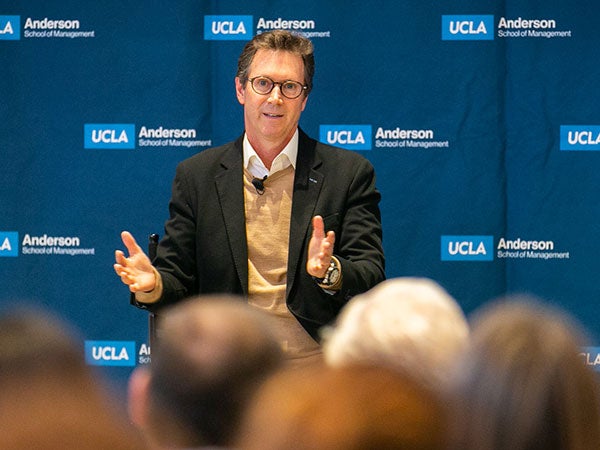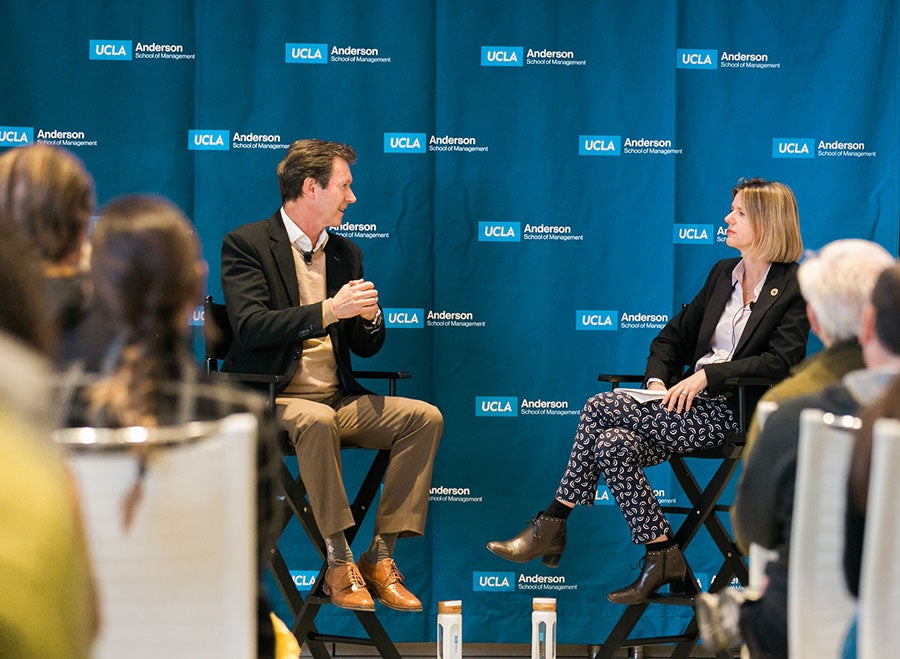Up Close and Personal
Many Roads Lead to Social Impact

As CEO of Mexico-based diversified dairy company Grupo Lala, Scot Rank (’89) led the firm’s transformation and expansion. For the previous 14 years, he was president and CEO of Walmart Mexico and Central America (Walmex), where his achievements in sustainability earned him global recognition. Early in his career as vice president of the Coca-Cola Company in Mexico, Rank noticed a tiny cost-cutting measure that could triple the budget for promotion of the Coca-Cola Foundation — which went on to become a premiere supporter of indigenous schools across the country. As UCLA Anderson student Pierre Derycz (FEMBA ’21) observes, Rank, who serves on Anderson’s Board of Advisors, fell into corporate social responsibility and sustainability almost by accident.
When is a company considered “social enough”? Can corporations like Walmart, given their tremendous market share and influence, generate greater impact by visibly engaging all stakeholders to effect broad social and environmental change, rather than by narrowly following a self-serving cost-reduction model?
As director of speaker series and alumni for UCLA Anderson’s Net Impact chapter, I was pleased to welcome alumnus and Anderson board member Scot Rank to Impact@Anderson’s signature High-Impact Tea series for a discussion moderated by Professor Magali Delmas. The hundred-strong audience included 25 students enrolled in Professor Jennifer Walske’s course, Impact Creation, Analysis and Evaluation.
Rank reflected on his professional experience implementing sustainable practices in the multinational retail sector. He addressed some core concerns outlined in Professor Walske’s curriculum, including the main takeaway of our very first class: Many roads lead to impact, some more intentionally than others. More important, engaging in impact cannot be viewed through a black and white lens. It requires a constant evaluation of contextual benefits and tradeoffs to determine net stakeholder value.
Rank described Walmex’s emerging leadership in sustainability as not only an added value for society, but also an effective means of cutting the company’s costs. He highlighted his team’s entrepreneurial trial-and-error approach to productive solutions — from implementing all-LED lighting (ultimately generating little measurable impact), to adopting waterless urinals (tremendously reducing water use and cost, and emulated by many organizations in Mexico).

Professor Magali Delmas moderated the discussion with Scot Rank
Walmex pragmatically worked within the limits of its operating landscape. For example, the company experimented with water recycling, only to be confronted by various state laws in Mexico requiring potable water be used for irrigation. Rather than devote resources to drive legislative change, Walmex made a calculated decision to direct its efforts to the next environmental challenge in their pipeline.
So, whereas corporate social responsibility (CSR) practices can attack multiple challenges, including all 17 United Nations Sustainable Development Goals, Rank encourages customers and investors to applaud companies meaningfully affecting select “impact” areas rather than suboptimally addressing a comprehensive set of social and environmental issues. Supporting the argument, Professor Delmas observed that many companies today elect not even to disclose their social impact efforts, for fear consumers might be unforgiving if they perceive a company is not moving the needle in all areas of impact.
My key takeaway from Rank’s comments is that a balance of salient activities must be struck uniquely by each organization. When pressed on his current venture leading a special purpose acquisition company (SPAC), Rank acknowledged that he does not see sustainability as a core precondition to attracting investment capital. Instead, he envisions it naturally growing and incorporating over time within the very operations of the companies the SPAC will fund.
We may question how “sustainable” his endeavor truly is, but if more people in all walks of business shared Rank’s vision, we’d be well on our way to effecting tangible environmental and social change.